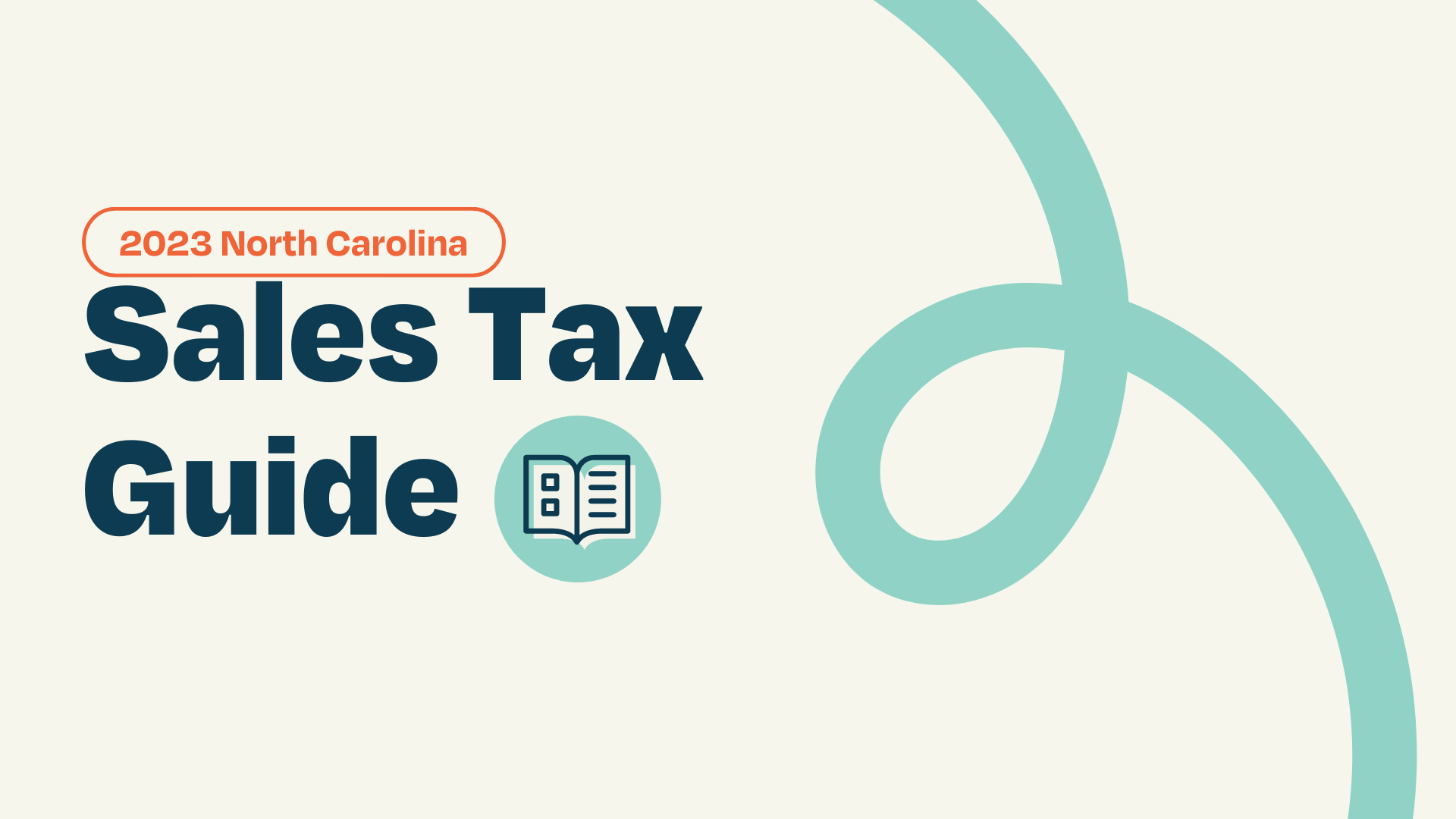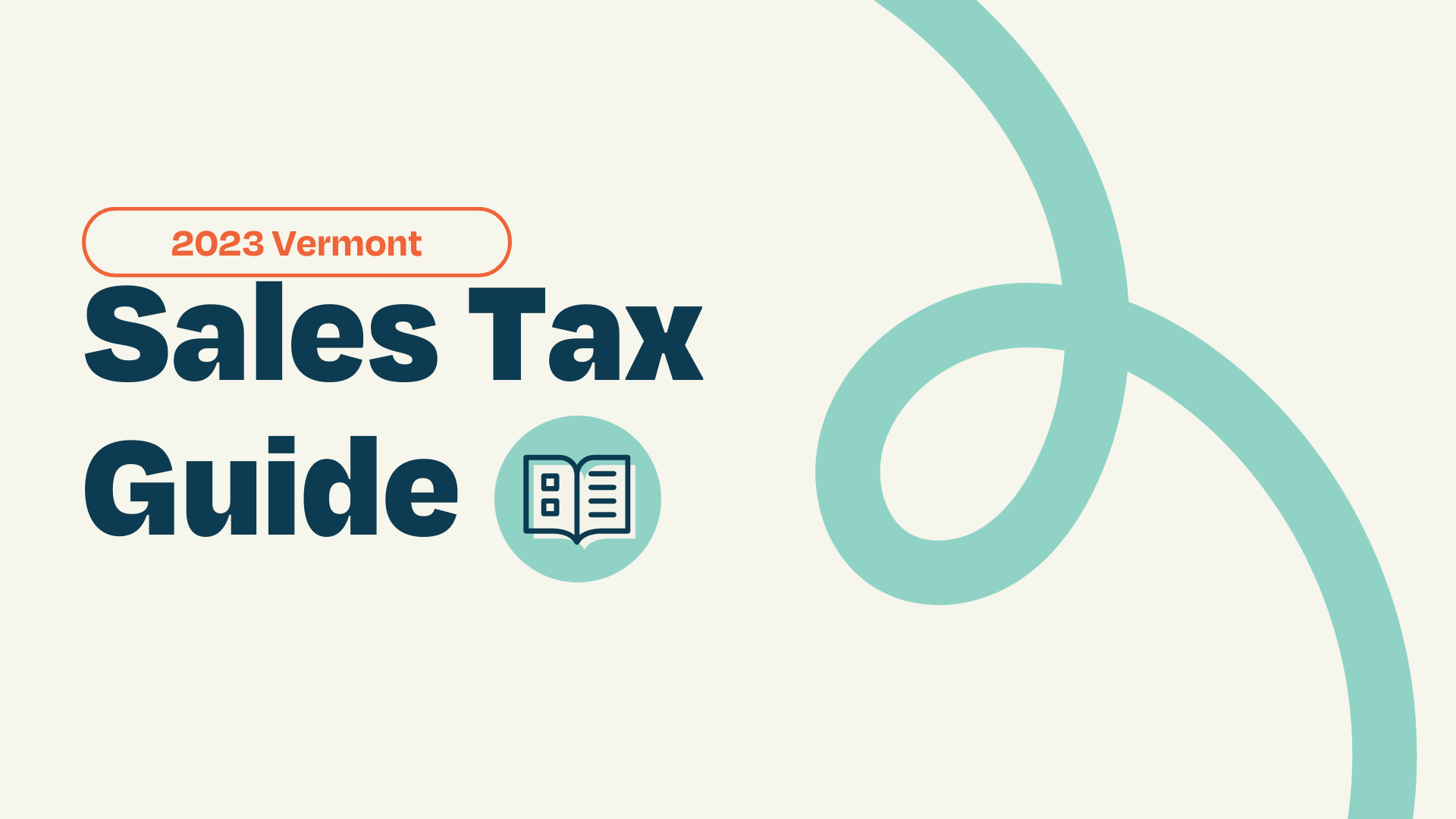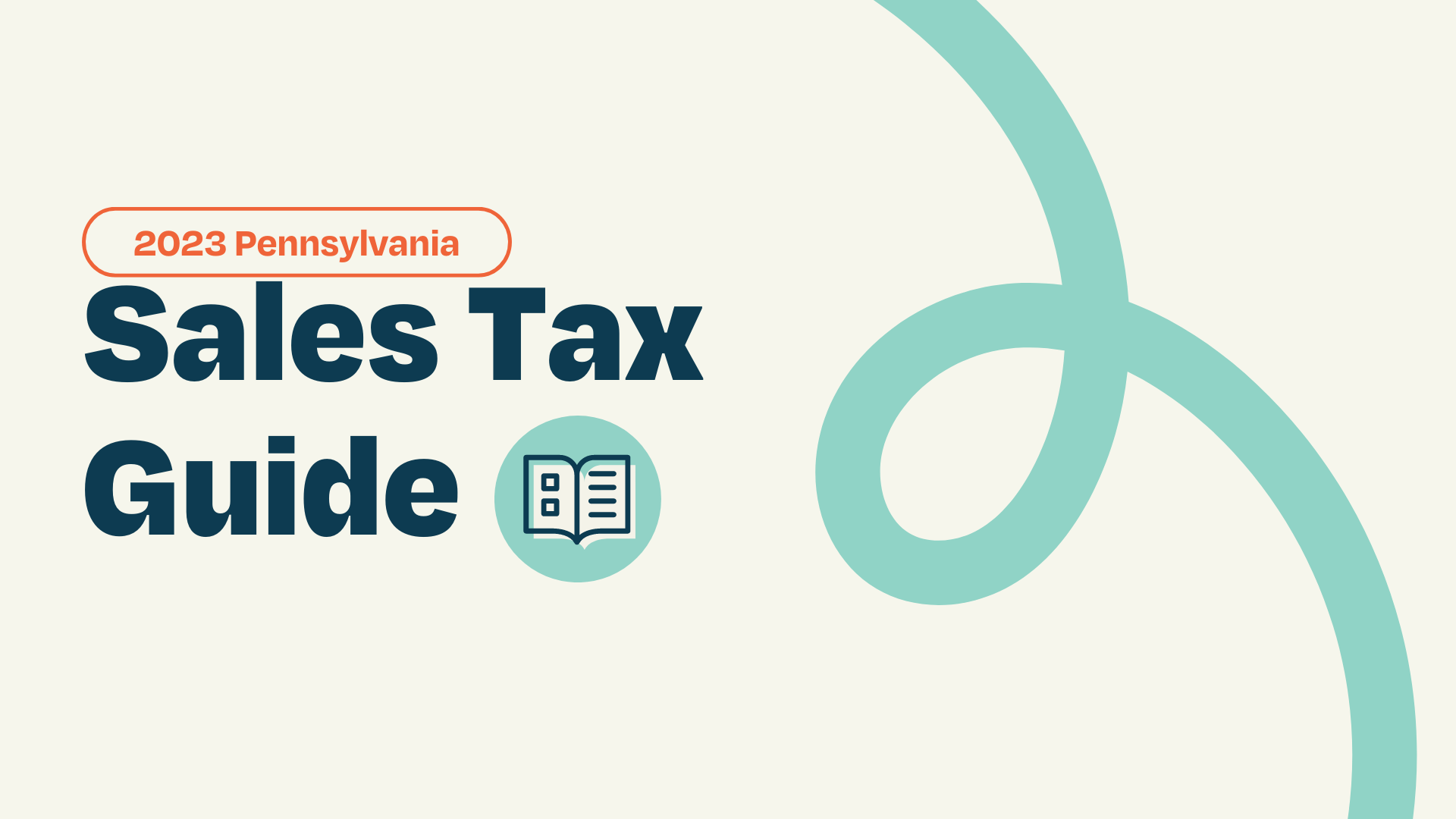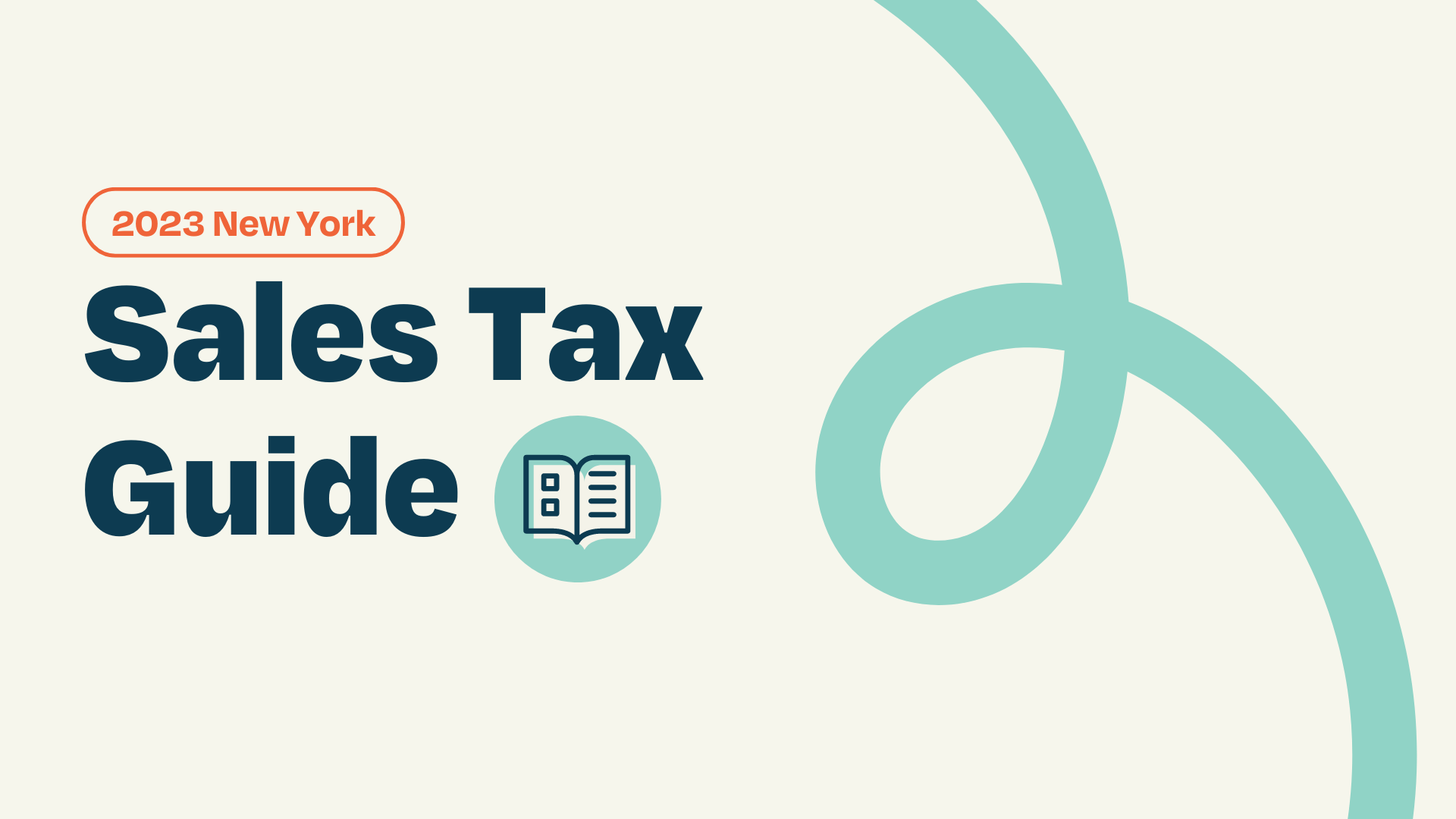27 min read
North Carolina 2023 Sales Tax Guide
North Carolina Sales Tax in a Word As a small business owner, navigating the world of sales tax can feel like a rollercoaster ride. One moment...
Navigating the labyrinth of sales tax regulations can be a daunting task, especially for busy small business owners. But fear not, intrepid entrepreneurs! We've got your back with this comprehensive guide to filing and paying sales taxes in the Empire State. In this lively and informative blog post, we'll break down the essentials of New York sales tax into bite-sized, easily digestible nuggets of wisdom. You'll learn about filing frequencies, due dates, penalties, incentives, and even some handy tips to sidestep common pitfalls. So grab a cup of your favorite beverage, put on your metaphorical tax-filing cape, and let's soar through the world of New York sales tax together!
|
Table of Contents |
When dealing with sales tax in New York, it's essential to know where to turn for information, guidance, and assistance. In this section, we'll introduce you to the organization responsible for managing sales tax in the state and provide you with their contact information.
The New York State Department of Taxation and Finance is the governing body responsible for administering, collecting, and enforcing sales tax within the state. They provide valuable resources, forms, and assistance to help businesses stay compliant with New York sales tax laws and regulations.
Here is the contact information for the New York State Department of Taxation and Finance:
|
Mailing Address |
New York State Department of Taxation and Finance W A Harriman Campus Albany, NY 12227 |
|
Phone Numbers |
(518) 485-2889 (Sales Tax Information Center) |
|
Website |
The Department of Taxation and Finance's website offers a wealth of information, including tax forms, guides, and frequently asked questions. Additionally, you can find online services for registering your business, filing returns, and making payments.
For more complex or specific questions regarding your business's sales tax obligations, it's always a good idea to consult with a tax professional or reach out to the Department of Taxation and Finance directly for guidance and support.
Before diving into the specifics of New York sales tax, it's crucial to determine if your business has a nexus in the state. Nexus refers to a significant presence or connection that requires your business to collect and remit sales tax.
There are several types of nexus that can create an obligation for your business to collect and remit sales tax in New York. Let's explore each of them in more detail.
Physical nexus is established when your business has a tangible presence within the state. This can include:
Owning or leasing property, such as an office, warehouse, or retail store
Having employees, agents, or representatives working in the state
Storing inventory in a warehouse or fulfillment center in the state
Attending trade shows or conducting demonstrations in the state
Economic nexus is established when your business exceeds a certain threshold of sales or transactions within the state, even without a physical presence. In New York, economic nexus is triggered if your business has:
More than $300,000 in gross sales from New York customers, and
At least 100 separate transactions with New York customers during the previous four quarters
Affiliate nexus is established when your business has a relationship with another entity in the state that helps to promote or facilitate sales. This can include:
A parent company, subsidiary, or other related business entity operating in the state
A third-party agent or representative who provides sales, customer service, or other support on your behalf in the state
Click-through nexus is established when your business enters into an agreement with a New York-based entity to refer customers through a website link or other online referral method, and the following conditions are met:
The entity receives a commission or other compensation for referrals that result in sales
Your gross sales from these referrals exceed $10,000 in the previous four quarters
Marketplace nexus is established when your business uses a third-party marketplace provider (such as Amazon, eBay, or Etsy) to facilitate sales to customers in New York, and the marketplace provider collects and remits sales tax on your behalf.
Yes, New York has use tax laws, which apply to purchases made by New York residents from out-of-state sellers that are not required to collect sales tax. Use tax rates are the same as the sales tax rates and are meant to level the playing field for in-state and out-of-state sellers.
New York residents are responsible for reporting and paying use tax on their individual income tax returns for taxable items purchased without the collection of sales tax. Businesses operating in the state are also responsible for reporting and remitting use tax on items purchased for use within the business when sales tax has not been collected.
Before you can start collecting sales tax in New York, you'll need to register your business and obtain a sales tax license. In this section, we'll walk you through the registration process, explore associated costs, and discuss any additional registration requirements.
Registering for sales tax in New York is a straightforward process that can be completed online. Here's a step-by-step guide to help you get started:
Visit the New York State Department of Taxation and Finance website: Go to the Online Services page and click on "Register a Business Online" to begin the registration process.
Create an Online Services account: If you don't already have an Online Services account, you'll need to create one. Click "Create Account" and follow the prompts to set up your account with a username and password.
Log in to your account: Once you have an Online Services account, log in and select the "Businesses" tab. Then, click on "Register a business" and choose "Sales tax – vendors and purchasers."
Complete the application: Follow the instructions to complete the online application form, providing information about your business structure, ownership, and sales activities. You'll need to provide details such as your business name, address, contact information, and a description of the products or services you sell.
Submit the application: Review your information for accuracy, and then submit the application. Shortly after submitting, you should receive a confirmation email from the Department of Taxation and Finance.
Wait for your Certificate of Authority: Once your application has been processed and approved, you'll receive a Certificate of Authority by mail. This certificate allows you to legally collect sales tax in New York and must be displayed prominently at your place of business.
Good news! There is no fee to register for a New York sales tax license or to obtain a Certificate of Authority.
Yes, you'll need a Federal Tax ID Number, also known as an Employer Identification Number (EIN), to register for a New York sales tax license. If you don't already have an EIN, you can apply for one online through the IRS website.
In addition to registering with the New York State Department of Taxation and Finance, you may need to register with other state or local agencies, depending on the nature of your business. Here are a few examples:
New York State Department of Labor: If you have employees, you'll need to register for unemployment insurance, workers' compensation, and disability insurance. Visit the Department of Labor's website for more information.
New York State Department of State: If your business is a corporation, limited liability company (LLC), or limited partnership, you'll need to register with the Department of State. Visit the Department of State's website for more information.
Local government: Depending on your location and the type of business you operate, you may need additional licenses or permits from your local government. Check with your city or county clerk's office for information on local requirements.
Remember to stay up-to-date with any changes in registration requirements and consult with a tax professional if you're unsure about specific registration steps for your business.
Once you've registered for sales tax and received your Certificate of Authority, it's time to start collecting sales tax from your customers. In this section, we'll discuss whether New York is an origin or destination sales tax state, the types of sales subject to sales tax, and exemptions you may encounter.
New York is a destination-based sales tax state. This means that sales tax is based on the location of the buyer, not the seller. When selling to a customer in New York, you must collect sales tax at the rate applicable to the jurisdiction in which the buyer receives the product or service.
In general, New York sales tax applies to the sale of tangible personal property, certain services, and digital products. Some examples of taxable items and services include:
Clothing and footwear costing over $110 per item or pair
Furniture, appliances, and electronics
Motor vehicles, boats, and trailers
Prepared food and beverages
Hotel accommodations
Admission to entertainment events and recreational facilities
Telecommunications services
Pre-written computer software
Yes, SaaS is taxable in New York. The New York State Department of Taxation and Finance (NYDTF) defines SaaS as "a software licensing arrangement under which a customer subscribes to access a software application hosted by a vendor." Because SaaS is delivered electronically, it is considered taxable.
The NYDTF has issued several advisory opinions that clarify that SaaS is taxable in New York. In TSB-A-13(22)S, the NYDTF specifically stated that SaaS is taxable even if it is not delivered in a tangible medium.
The following are some of the specific types of SaaS that are taxable in New York:
Software as a service (SaaS): This includes software that is delivered over the internet and accessed by users through a web browser.
Cloud computing: This includes services that provide access to computing resources, such as storage, processing power, and networking, over the internet.
Web-based software: This includes software that is accessed through a web browser and does not require any installation on the user's computer.
If you are selling SaaS in New York, you will need to collect sales tax on the sales.
There are several items and services that are exempt from New York sales tax, including:
Unprepared food and beverages, such as groceries
Prescription and nonprescription drugs
Medical equipment and supplies
Clothing and footwear costing $110 or less per item or pair
Newspapers, magazines, and other periodicals
Educational and professional services, such as medical care, legal services, and accounting services
Manufacturing machinery and equipment
Certain organizations and individuals may be eligible for sales tax exemptions in New York. Examples of exempt organizations include:
Government agencies
Charitable organizations
Educational institutions
Religious organizations
Exempt individuals may include:
Native American tribal members making purchases on reservation land
Diplomatic personnel with appropriate identification
If a customer qualifies for a sales tax exemption, you must obtain a properly completed exemption certificate from the customer and maintain it in your records. The exemption certificate serves as evidence that the sale was exempt from sales tax. You should not collect sales tax on transactions where a valid exemption certificate is provided.
If you lose or misplace a sales tax exemption certificate, it's important to request a replacement from your customer. Failure to maintain accurate records of exemption certificates may result in your business being held liable for any uncollected sales tax during an audit.
In conclusion, understanding the nuances of collecting sales tax in New York is essential for your business. Familiarize yourself with the applicable rates, exemptions, and regulations to ensure you're compliant and avoid any potential penalties or audits. Don't hesitate to consult with a tax professional if you need guidance or assistance in navigating the complexities of New York sales tax.
After you've collected sales tax from your customers, it's time to file your sales tax return and remit the taxes owed to the New York State Department of Taxation and Finance. In this section, we'll discuss when and how to file your sales tax return, potential penalties you may face, and any sales tax incentives available in New York.
The frequency at which you're required to file and pay sales tax in New York depends on your sales volume. The state assigns a filing frequency based on your average tax liability, which falls into one of three categories:
The filing frequency and dues dates are as follows:
|
Monthly Filing |
Businesses with an average tax liability of more than $600 per month are required to file and pay sales tax on a monthly basis. |
|
Quarterly Filing |
Businesses with an average tax liability between $200 and $600 per month are required to file and pay sales tax on a quarterly basis.
|
|
Annual Filing |
Businesses with an average tax liability of less than $200 per month are required to file and pay sales tax on an annual basis. |
If a sales tax filing date falls on a weekend or holiday, the due date is extended to the next business day.
Filing your New York sales tax return is a straightforward process that can be completed electronically through the state's Online Services system. Here's an in-depth guide for filing your sales tax return:
Log in to your Online Services account: Visit the New York State Department of Taxation and Finance website and log in to your Online Services account.
Access your sales tax account: From your account dashboard, click on the "Businesses" tab and then select "Sales tax – file and pay." This will take you to your sales tax account.
Choose the appropriate filing period: Select the filing period for which you're submitting a return and click "File a return."
Complete the sales tax return form: Fill out the required information on the sales tax return form, including your total sales, taxable sales, and the amount of sales tax collected. Be sure to break down the sales tax collected by jurisdiction, as required by New York's destination-based sales tax system.
Review your return: Before submitting your return, review the information for accuracy and make any necessary corrections.
Submit your return: After ensuring the information on your return is correct, click "Submit" to file your sales tax return.
Make a payment: If you owe sales tax, you'll be prompted to make a payment. You can pay by electronic funds transfer (EFT), credit card, or check. If paying by check, follow the instructions provided for mailing your payment to the appropriate address.
Failure to file or pay sales tax on time can result in penalties and interest charges. Some common penalties include:
Late filing penalty: 10% of the tax due, or $50, whichever is greater
Late payment penalty: Ranges from 2% to 10% of the tax due, depending on the number of days late
Underpayment penalty: 10% of the tax underpaid
Fraud penalty: Up to 50% of the tax due
Interest is also charged on the unpaid tax at the current interest rate, which is updated quarterly.
New York offers several sales tax incentives for businesses, including tax credits, exemptions, and reduced tax rates. Some examples of sales tax incentives include:
Empire Zones Program: Businesses located in designated Empire Zones may be eligible for sales tax exemptions on certain purchases, as well as other tax benefits.
Start-Up NY Program: Eligible businesses participating in the Start-Up NY Program can enjoy sales tax exemptions on qualifying purchases, as well as other tax benefits.
Film Production Tax Credit: Qualified film and television productions in New York can receive a sales tax exemption on purchases related to the production.
To determine if your business is eligible for any sales tax incentives, consult with a tax professional or review the New York State Department of Taxation and Finance website for more information.
Filing sales tax returns can be a complex process, and even small mistakes can lead to penalties and interest charges.
To help you navigate the process with confidence, here are five tips to avoid common mistakes when filing your New York sales tax returns:
Maintaining detailed and organized records of your sales transactions is crucial for filing accurate sales tax returns. Keep track of taxable and non-taxable sales, sales tax exemptions, and the amount of tax collected for each jurisdiction. By having this information easily accessible, you can minimize errors when completing your sales tax return.
New York is a destination-based sales tax state, which means you need to collect sales tax based on the buyer's location. Familiarize yourself with the various sales tax rates for different jurisdictions, and use tax rate lookup tools or software to ensure you're charging the correct rate for each sale.
Use tax is often overlooked but is just as important as sales tax. Use tax applies to taxable items and services purchased from out-of-state vendors that don't collect New York sales tax. As a business owner, you're responsible for reporting and remitting use tax on your sales tax return. Be sure to track your out-of-state purchases and calculate the appropriate use tax.
Late filing and payment can result in penalties and interest charges, so it's essential to know your filing frequency and due dates. Set reminders or use calendar alerts to ensure you never miss a deadline. If you're unsure of your filing frequency, check your Certificate of Authority or consult with the New York State Department of Taxation and Finance.
Filing your sales tax return electronically through the New York State Department of Taxation and Finance's Online Services system is a convenient and efficient way to submit your return. E-filing helps minimize errors, as the system will automatically calculate your total sales tax due and validate the information you enter. Additionally, you'll receive instant confirmation that your return has been submitted, reducing the risk of lost or delayed mail.
By following these tips, you can avoid common pitfalls and ensure your sales tax returns are accurate and timely. If you're ever unsure about any aspect of the filing process, don't hesitate to consult with a tax professional or contact the New York State Department of Taxation and Finance for guidance.
And there you have it, fellow tax voyagers! We've journeyed through the ins and outs of filing and paying sales taxes in New York, explored the consequences of common mistakes, and even uncovered some valuable incentives. With this newfound knowledge, you're now equipped to tackle the sales tax filing process with confidence and ease.
Remember, staying organized, understanding tax rates, meeting deadlines, and embracing electronic filing are the keys to a smooth and stress-free sales tax experience. By keeping these principles in mind and following the tips we've shared, you'll be well on your way to mastering the art of New York sales tax compliance.
As you continue on your small business journey, know that we at Accountingprose are here to support you every step of the way. We believe in your success and are ready to help you conquer any tax challenges that may come your way. So go forth, intrepid entrepreneur, and make your mark on the vibrant New York business landscape!
|
Ready to work with a New York sales tax expert? We've love to work with you! |
|
Alaska Sales Tax Guide (N/A) |
||||
|
Montana Sales Tax Guide (NA) |
||||
|
Oregon Sales Tax Guide (N/A) |
||||
|
Delaware Sales Tax Guide (N/A) |
||||
|
New Hampshire Sales Tax Guide (NA) |
||||
And don't forget to check out our blog about Economic Nexus, which serves as an invaluable resource for businesses who have sales that are subject to sales tax.
This blog is for informational purposes only and the information is accurate as of 2023-06-19. If you want legal advice on sales tax law for your business, please contact a State and Local Tax (SALT) professional. Keep in mind that sales tax regulations and laws are subject to change at any time. While we strive to keep our blog current, this blog possibly may be out of date by the time you review it.

27 min read
North Carolina Sales Tax in a Word As a small business owner, navigating the world of sales tax can feel like a rollercoaster ride. One moment...

24 min read
Vermont Sales Tax in a Word Welcome to the world of Vermont sales tax, where the maple syrup flows freely and the tax guidelines are as...

27 min read
Pennsylvania Sales Tax in a Word Hey there, fellow Pennsylvania business owners! We know that dealing with sales taxes can feel like...
